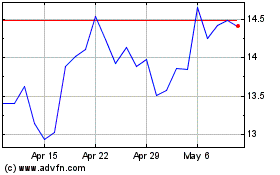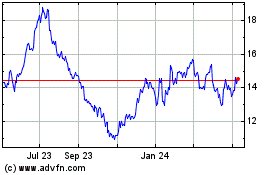By Doug Cameron and Alison Sider
This article is being republished as part of our daily
reproduction of WSJ.com articles that also appeared in the U.S.
print edition of The Wall Street Journal (July 23, 2019).
The prolonged grounding of Boeing Co.'s 737 MAX aircraft is
rippling through the U.S. economy, hurting the nation's trade
balance and clouding the outlook for airlines, suppliers and their
tens of thousands of workers.
Companies ranging from American Airlines Group Inc., to engine
maker General Electric Co. and smaller parts suppliers have cited
the grounding and halt in deliveries of the jetliner for financial
damage or the suspension of profit guidance. Several U.S. and
foreign airlines are cutting back on routes and capacity growth or
delaying pilot hiring and promotions because of the MAX.
Boeing continues to make the MAX and other versions of the 737
at a rate of 42 a month, after cutting monthly output from 52 in
April. Economists say the production cuts likely weighed on U.S.
gross domestic product in the second quarter, and warn the negative
impact could intensify as long as the plane maker is unable to
resume deliveries.
Boeing is the largest U.S. manufacturing exporter and one of the
nation's top private employers. The MAX is its best-selling plane,
and jets worth more than $30 billion sit idle since global
regulators grounded the aircraft following a second fatal crash in
March.
The company hopes to resume deliveries in the fourth quarter,
but some airlines and officials expect the MAX to stay out of
service until next year. That would further dent U.S. exports and
durable-goods orders at a time when some manufacturers are
experiencing higher costs and lowering their output due to tariffs
and trade tensions.
"It has already been a significant part of the slowdown story,"
said Ward McCarthy, chief financial economist at Jefferies LLC.
U.S. durable-goods orders in May fell 1.3% from the prior month,
including a $2 billion drop in sales of civilian aircraft and
spares, the Commerce Department said last month. U.S. exports of
commercial aircraft were down 12% in the first five months of 2019
compared with a year earlier.
The U.S. economy is still growing, with analysts surveyed by The
Wall Street Journal pegging expansion in the second quarter at an
annualized rate of 2%. Michael Feroli, chief U.S. economist at J.P.
Morgan Chase, estimates Boeing's production cuts shaved roughly a
tenth of a percentage point off his forecast.
"The economy is big. It's moving along quite well even in spite
of the issues that Boeing is having," Mr. Feroli said. Economists
say that the impact would be more pronounced if Boeing cuts
production further, as some analysts have said it might need
to.
Boeing has reduced output to limit the number of planes piling
up at its factories, and that has pressured thousands of suppliers
that invested heavily in operations to feed MAX production.
Uncertainty over the return of the MAX and Boeing's production
plans have made it tougher for those suppliers to make hiring and
investment decisions.
"We probably modeled four, five scenarios literally a week as to
when are they going to get back in the air," said GE Aviation
President David Joyce at the Paris Airshow last month.
GE, the sole engine provider for the MAX through its joint
venture with France's Safran SA, expects the MAX slowdown to cost
it as much as $300 million in the second quarter. The partners have
trimmed MAX engine output by 5% but are keeping their own suppliers
working at a higher clip in anticipation of Boeing boosting output
again next year.
Boeing last week said that it expects to pay up to $5.6 billion
in compensation to affected airlines over several years. That is in
addition to $2.7 billion in charges for the expected higher cost of
producing the planes. The company is due to report its
second-quarter earnings on July 24.
Boeing hasn't cut any staff because of the MAX crisis, though
some employees have said they worry layoffs could be coming. Boeing
has trimmed from its ranks of contractors recently as it tries to
be prudent with its cash. A spokesman said that pruning wasn't
related to the MAX grounding.
Boeing said last week it plans to boost 737 production from the
current rate of 42 planes a month to 57 sometime next year while
also delivering the backlog piling up at its factories. Analysts
estimate there could be as many as 300 undelivered jets by the end
of the year.
Many of Boeing's 13,000 domestic suppliers have said they
continue to produce at a rate of 52 planes a month. Boeing's recent
commitment to avoid further cuts and ramp up production when the
MAX is cleared to fly have buoyed some big suppliers.
Boeing remains the largest component of the Dow Jones Industrial
index, accounting for 9.4% of the benchmark, This year the stock is
up almost 16% -- off its all-time high but tracking gains in the
broader aerospace sector based on big order backlogs.
Spirit AeroSystems Holdings Inc., which makes the MAX fuselage
and engine parts, suspended financial guidance this year after the
plane was grounded. Spirit's shares gained 7.1% on Friday after
Boeing laid out its bullish production target. Stocks of other
suppliers such as Triumph Group Inc. and Allegheny Technologies
Inc. climbed more than 2% and 3%, respectively. Boeing closed up
4.5%, though lost some ground in Monday trading.
Airlines have also been buffeted by the changing outlook for the
MAX's return. United Airlines Holdings Inc. said last week that the
grounding has cut into its planned capacity growth this year.
American Airlines said earlier this month that it canceled 7,800
flights in the second quarter due to the grounding, resulting in a
$185 million hit to pretax profits.
Southwest Airlines Co., the biggest carrier of domestic
passengers and the world's largest U.S. MAX operator, had hired at
a rapid clip in anticipation of adding over 40 more of the jets
this year to the 34 already in its fleet. Now Southwest is tapping
the brakes. It has postponed initial training for about 50 new
pilots and put promotions on hold for another 50 seeking to advance
from co-pilot to captain.
Some pilots said the MAX suspension has cut into flying they
count on for additional cash.
One Southwest pilot said there has been about a 25% reduction in
the extra flying he would typically take on at this time of year.
"You make hay when the sun shines, but this summer, the sun's not
shining," he said.
A majority of the roughly 400 Air Canada pilots who were flying
the carrier's 24 MAX planes before the grounding are now on leave
and receiving partial pay, two people familiar with the company's
operations said.
Air Canada declined to comment on the matter.
--Kim Mackrael contributed to this article.
Write to Doug Cameron at doug.cameron@wsj.com and Alison Sider
at alison.sider@wsj.com
(END) Dow Jones Newswires
July 23, 2019 02:47 ET (06:47 GMT)
Copyright (c) 2019 Dow Jones & Company, Inc.
American Airlines (NASDAQ:AAL)
Historical Stock Chart
From Mar 2024 to Apr 2024

American Airlines (NASDAQ:AAL)
Historical Stock Chart
From Apr 2023 to Apr 2024
